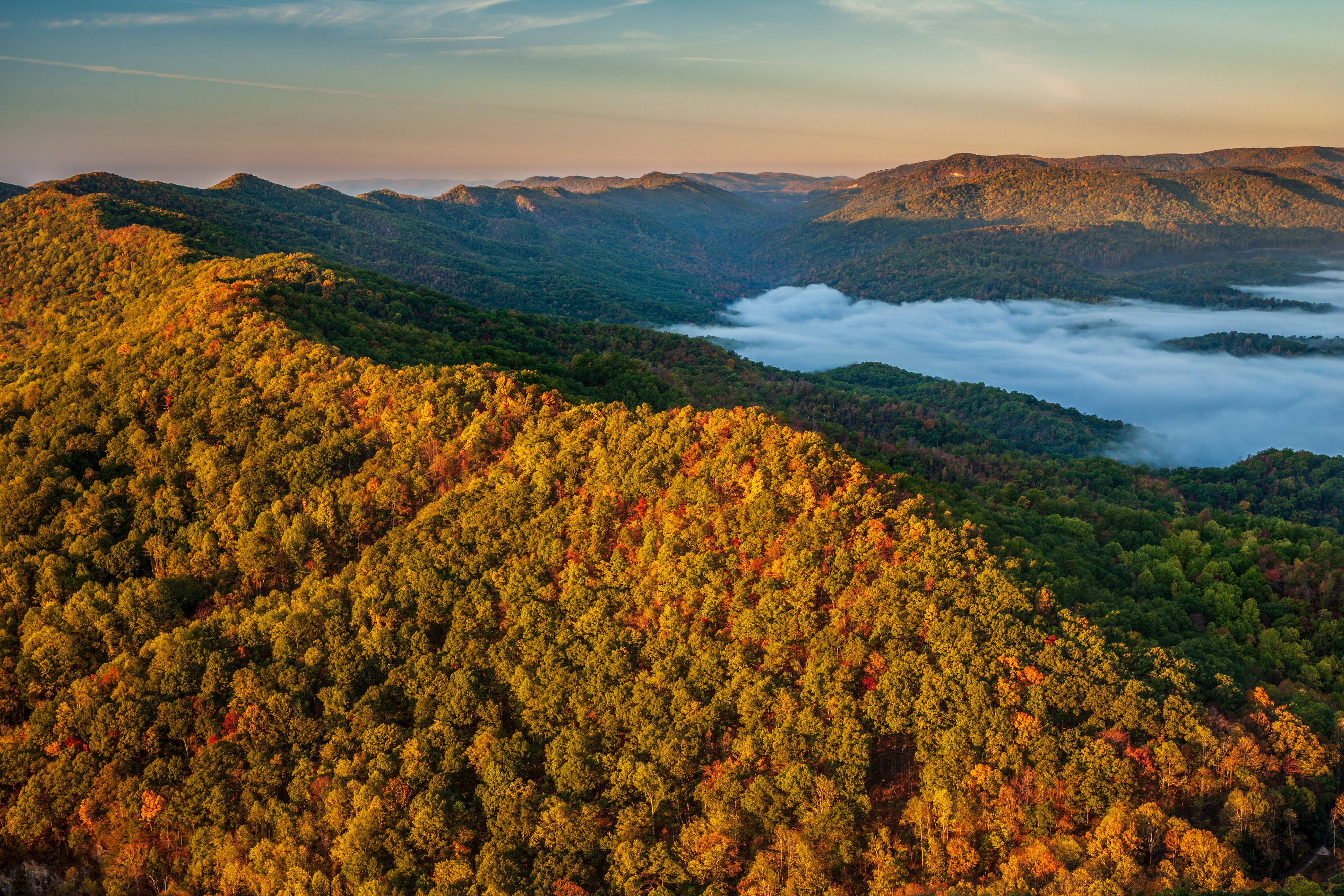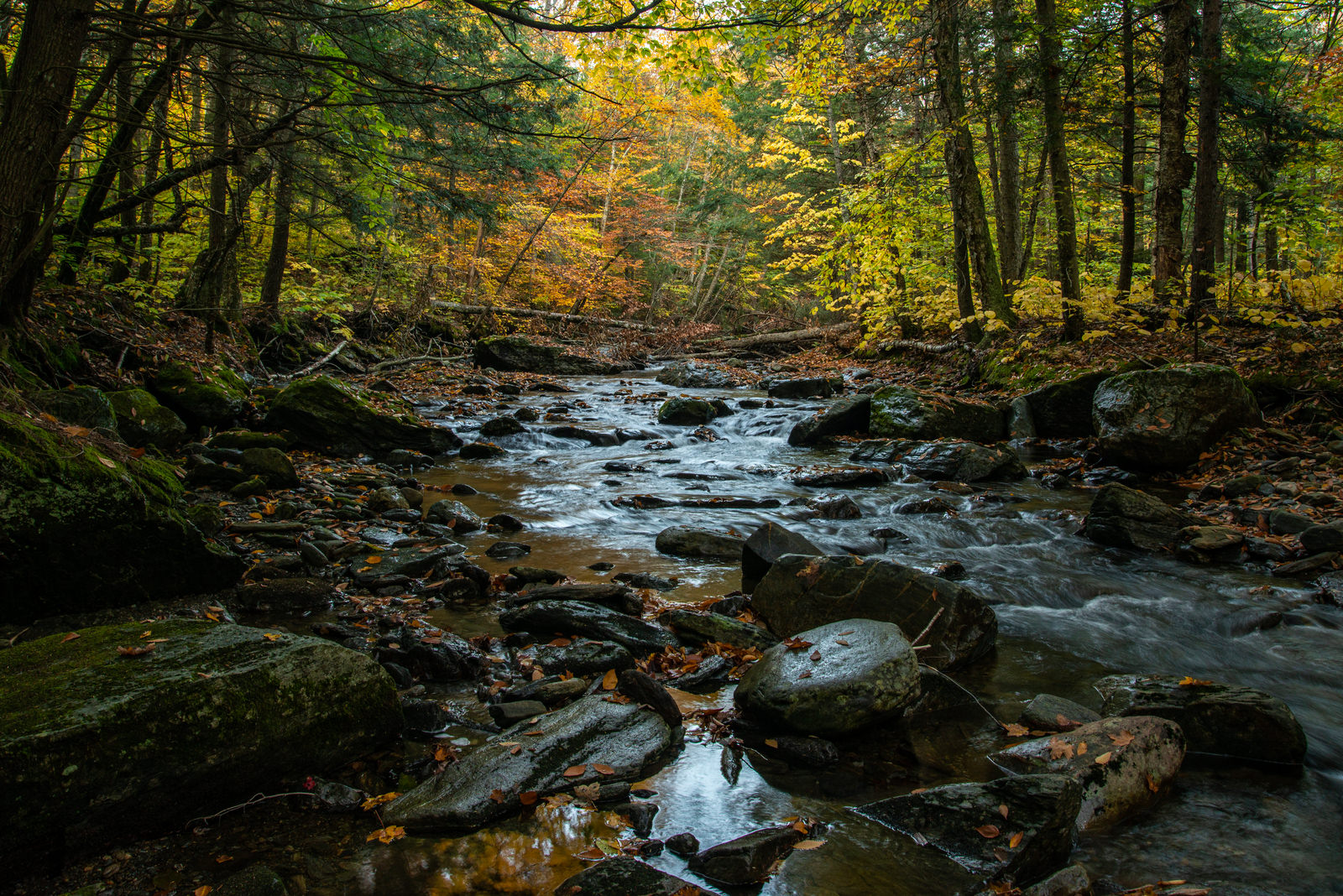The Cumberland Forest Project
The Nature Conservancy announces one of the largest land projects in its history of working in Kentucky and Tennessee.
The Nature Conservancy’s Cumberland Forest Project spans 253,000 acres in Kentucky, Tennessee and Virginia, in one of the most important areas for climate resiliency in North America—the Central Appalachian Mountains. In April 2019, TNC arranged the acquisition of 100,000 acres in Kentucky and Tennessee. As one of the largest land deals in TNC’s history of working in these two states, this project brings together impact investment, climate resiliency, carbon markets, sustainable timber harvest and recreational and economic opportunities for people and communities.
The Project
The second phase of the project added 153,000 acres in Virginia, making the overall project one of the largest and most innovative land conservation and ecological restoration efforts ever pursued by TNC in the eastern United States. The project uses investment and impact capital to conserve iconic American landscapes and demonstrate the economic and ecological benefits of sustainable forest management.
The project builds on TNC’s track record in sustainable forestry, including the nearby Clinch Valley Program in Virginia, and the multi-state Family Forest Carbon Program. What sets Cumberland Forest apart, however, is its design as an impact investment fund that seeks competitive rates of return for third-party investors. TNC is a co-investor in the fund and will manage the properties as the fund’s General Partner.
The Central Appalachian region spans six states and, at more than 50,000 square miles, is among the most awe-inspiring landscapes in America. TNC research has identified the region as a globally significant biodiversity hotspot, a major North American migratory corridor, and home to a network of watersheds vital to both people and nature. The properties acquired in the Cumberland Forest Project feature expansive climate-resilient forests and more than 700 miles of headwater streams that feed into globally important waters, including the Clinch, Cumberland and larger Tennessee and Ohio River Systems.
But achieving conservation goals at such a scale is difficult if relying solely on philanthropic funding. By structuring the project as an investment, TNC built on its decades of donor-funded scientific research and forestry expertise to offer impact-oriented investors a new perspective on the economic value of nature.
The Kentucky and Tennessee Property
The 100,000-acre property spanning Kentucky and Tennessee is known as Ataya. TNC’s management of the property will focus on maintaining and restoring forest health, protecting and improving water quality, providing outdoor recreation opportunities and supporting local economies. TNC seeks to conduct environmentally beneficial forest management activities, such as sustainable harvesting under the standards of the Forest Stewardship Council (FSC). The forest will be managed with the goal of increasing the storage of atmospheric carbon to help mitigate climate change as a certified forest carbon offset project under the rules of the California Air Resources Board, enabling the sale of carbon offsets as a revenue source for the property.
Forests: A World Beyond Trees
Sustainable timber harvesting prioritizes a healthy and diverse forest, helps mitigate climate change and helps protect the landscape long-term, all while generating revenues and contributing to the local economy. The quality of water supplied to nearby communities depends on the health and protected habitats of these forests, which absorb and filter water as it flows into streams and rivers. Forests help stabilize sediment, holding it in place and preventing run-off that contributes to water pollution.
In the Central Appalachians and across America, forests are critical to our economy, public health and environment. They store and filter more than half the nation’s water supply, provide habitat to thousands of forest-dependent wildlife and plant species and are a major carbon sink that sequesters 15 percent of all fossil fuel emissions in the U.S. Finally, these lands are central to local communities, providing various job opportunities and outdoor recreation such as hiking and hunting. TNC is committed to supporting these relationships between people and nature and continuing to provide these opportunities on the property.
Connecting the Cumberlands
In Kentucky and Tennessee, the 100,000-acre property contains 200 miles of headwater streams, most of which flow into the Kentucky and Cumberland Rivers. In addition to their ecological importance, the forests and streams on the property impact water quality and public water supplies in portions of Claiborne and Campbell counties in Tennessee and Bell, Knox and Leslie counties in Kentucky.
The property provides a critical linkage between the North Cumberland Wildlife Management Area in Tennessee and the Cumberland Gap National Historic Park and Kentucky Ridge State Forest in Kentucky. All of these areas represent core habitat along the Cumberland-Pine Mountain corridor, which is projected to be one of the most important migratory corridors in the face of a changing climate.
Management and Usage
In both states, TNC is committed to connecting its conservation work to the needs and interests of local communities. Through management of the property, TNC seeks to support local economies through sustainable timber harvesting that utilizes local loggers and mills. A recreational leasing program will provide access for wildlife viewing, fishing, hunting and other activities. Collaboration with community-based organizations will provide additional support for local economic development projects compatible with TNC’s conservation goals (e.g., outdoor recreation, sustainable forestry and nature-based tourism).
As is common in this region, ownership of the property is divided in two: a surface estate, which was acquired in this transaction, and a sub-surface mineral estate, which will continue to be owned by third parties. Because the mineral rights are held by third parties and subject to prior agreements, TNC has limited control over mining activities on the properties. TNC aims to work with regulators and mining companies using a collaborative, science-based approach to advocate for best environmental practices and restoration that can minimize the impacts of mineral extraction.
As the surface owner, an affiliate of TNC expects to receive compensation for any impacts these existing mining operations have on the property’s forests and infrastructure, and can direct those funds to restoration and conservation activities on the property. In addition, the surface owner is expected to receive royalties, which the affiliate plans to contribute in their entirety to third-party community organizations to support local economic and community development efforts.
In Depth: The Central Appalachian Mountains
The Central Appalachian Mountains have been identified as a key part of what will become one of the most important migratory corridors in North America as the climate changes. Healthy, resilient Central Appalachian forests are instrumental in allowing wildlife adapt to changing conditions by contributing to this corridor, which spans from the Blue Ridge Mountains to the Boreal forests of Canada. This same resilient forest corridor is home to globally significant levels of biodiversity, many species of which are found nowhere else on the planet.
Additionally, TNC and its partners have identified conservation and management of forests such as these as one of several natural climate solutions with the potential to deliver up to 37 percent of the emission reductions needed by 2030.
This region is home to a variety of plants and animals that depend on the health of this landscape for survival. The property is home to more than 100 species of Greatest Conservation Need according to state wildlife action plans, including the little brown bat, eastern meadowlark, black sandshell mussel, cerulean warbler, black mountain salamander and many more. The property also provides crucial headwater protection for the federally endangered Kentucky arrow darter.
We Can’t Save Nature Without You
Sign up to receive monthly conservation news and updates from Kentucky. Get a preview of Kentucky's Nature News email.

Stand Up For Nature
Support our work to protect nature in Kentucky.






